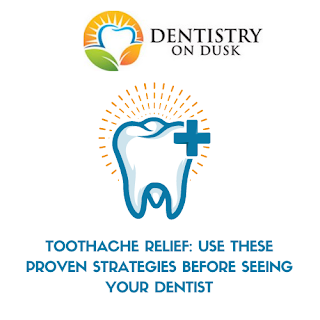Toothache Relief: Use These Proven Strategies Before Seeing Your Dentist
Delaying treatment can make the issue worse, leading to heightened pain and potential long-term consequences such as tooth loss or severe infection. That’s why knowing how to handle these situations can make a significant difference in managing your pain and preventing further complications.
Keep reading to explore practical toothache relief before seeing a dentist.
Home Remedies for Temporary Toothache Relief
After assessing the severity of your toothache but before you seek dental care, there are several home remedies you can try to temporarily alleviate your pain and discomfort.
1. Assess the Situation: The first step in dealing with a toothache emergency is to assess the severity of the pain and identify any visible signs of swelling or infection. Take a moment to gently probe the affected tooth or area with a clean finger or tongue to pinpoint the source of the discomfort. This initial assessment will help you determine the best course of action.
2. Rinse with Warm Salt Water: A simple yet effective remedy for toothaches is rinsing your mouth with warm salt water. Mix a teaspoon of salt in a glass of warm water and swish it around in your mouth for about 30 seconds before spitting it out. Salt water helps reduce inflammation, soothes sore gums, and can provide temporary toothache relief.
3. Use Over-the-Counter Pain Relievers: Over-the-counter pain relievers such as ibuprofen or acetaminophen help alleviate toothache pain until you can see a dentist. Follow the dosage instructions on the packaging carefully, and avoid applying aspirin directly to the tooth or gums, as this can lead to chemical burns.
For children experiencing toothaches, it's important to consult with your dentist or pediatrician about appropriate toothache medicine. Over-the-counter pain relievers like acetaminophen or ibuprofen can provide relief, but it's essential to follow dosage instructions carefully.
4. Apply a Cold Compress: If you're experiencing swelling or inflammation along with the toothache, applying a cold compress to the outside of your cheek can help reduce discomfort. Wrap a bag of ice or a cold pack in a thin cloth and hold it against the affected area for 15-20 minutes at a time. Repeat this process several times throughout the day as needed.
5. Avoid Trigger Foods and Drinks: Certain foods and drinks, especially those that are hot, cold, sweet, or acidic, can exacerbate toothache pain. Avoid consuming these trigger foods and drinks until you can receive proper dental treatment. Instead, opt for soft bland foods that are easy on the teeth and gums.
6. Keep the Area Clean: Proper oral hygiene is essential, even when dealing with a toothache emergency. Gently brush and floss your teeth to remove any food particles or debris that may be contributing to the pain. Be careful not to agitate the affected area too much, and use a soft-bristled toothbrush to avoid further irritation.
7. Try Over-the-Counter Dental Anesthetics: Over-the-counter dental anesthetics, such as benzocaine-based gels or numbing agents, can provide temporary relief from toothache pain by numbing the affected area. Apply the gel directly to the tooth and surrounding gums according to the product instructions. However, these products should only be used as directed and should not be relied upon as a long-term solution.
When Should You Visit the Dentist?
Here are some indicators that it's time to schedule an appointment with your dentist.
Persistent or Worsening Pain: If your toothache persists or worsens despite trying home remedies or over-the-counter medications, it's crucial to seek professional dental care. Persistent pain could indicate a more serious underlying issue that requires prompt treatment.
Signs of Infection: If you notice signs of infection such as swelling, redness, or the presence of pus around the affected tooth or gums, it's essential to see a dentist immediately. Untreated dental infections can spread and lead to more severe health complications.
Fever or Other Systemic Symptoms: A toothache accompanied by fever, nausea, or difficulty swallowing could be a sign of a systemic infection spreading beyond the oral cavity. In such cases, seeking urgent dental care is necessary to prevent the infection from spreading.
Trauma or Injury: If the toothache is the result of trauma or injury to the mouth, such as a cracked or broken tooth, it's essential to see a dentist promptly. Delaying treatment can exacerbate the damage and increase the risk of infection or tooth loss.
Preventive Care: Regular dental check-ups are essential for maintaining oral health and preventing toothaches and other dental problems. Even if you're not experiencing any pain or discomfort, it's essential to visit your dental office for routine exams and cleanings to detect and address potential issues before they escalate.
Toothaches can disrupt our lives with their sudden intensity, prompting a search for relief. Delaying treatment can worsen the situation, potentially leading to long-term consequences like tooth loss or severe infection. Knowing how to effectively manage these emergencies, as outlined here, is important. By prioritizing oral health and taking proactive steps, such as regular dental check-ups, you can mitigate the impact of toothaches and maintain your overall well-being.



Comments
Post a Comment